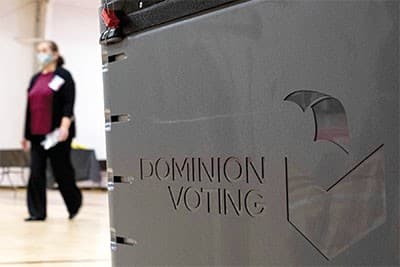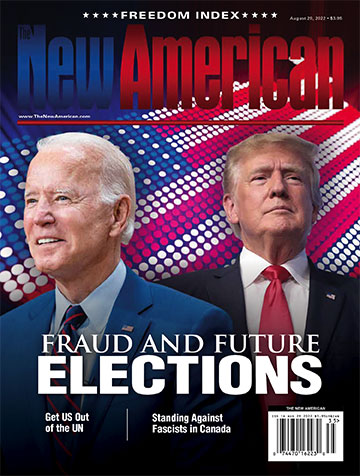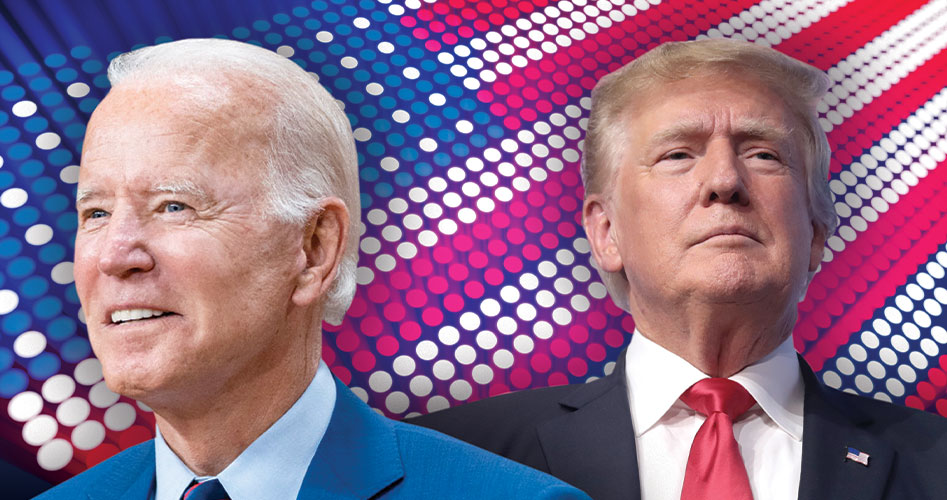Vol. 38, No. 16
08/29/2022
Fraud and Future Elections
Pundits claim the 2020 election was the "most secure in American history," but many Americans believe otherwise. Who is right? ...
Michigan Republican and former state senator Patrick Colbeck is facing potential legal action over his allegations of widespread fraud in the 2020 U.S. presidential election. Attorneys representing a major voting machine manufacturer are demanding that he retract “false claims” that have caused “enormous irreparable harm to Dominion [Voting Systems], its employees, and American democracy.”
Dominion has already filed defamation lawsuits against Fox News, Newsmax, One America News, and various individuals, including former Trump attorney Rudy Giuliani and MyPillow CEO Mike Lindell.
Colbeck’s answer is the publication of his latest book, The 2020 Coup: What Happened. What We Can Do. He describes it as a compilation of all the election fraud evidence amassed since November 2020 and recorded in documentaries such as Lindell’s Absolute series, Dinesh D’Souza’s 2000 Mules, Mollie Hemingway’s Rigged, and Patrick Byrne’s The Deep Rig. In addition, he includes a detailed explanation of how elections should operate, and offers a list of practical solutions aimed at securing future elections and ultimately preserving “the blessings of our constitutional republic.”
What makes Colbeck’s opinion on election integrity worthwhile? As former vice chair of elections and government reform in the Michigan State Senate, he has an intimate knowledge of election law. He is also an aerospace engineer and a certified Microsoft small-business specialist, with understanding of complex systems such as those employed in modern elections.
Moreover, he served as a certified poll challenger in Detroit during the 2020 election, and says he personally witnessed evidence of fraud to which many others have attested under oath: late-night ballot drops in violation of state law, pizza boxes taped over windows to prevent poll challengers from witnessing counts after they had been illegally barred from entry, and specious media stories about what had happened.
“I was one of the guys crawling around on the floor checking the pathways for Cat-5 cables,” he told The New American, “and I confirmed that these computers were indeed connected to the internet during tabulation.”
Experts agree that internet connection would pose critical security vulnerabilities — enough to compromise election integrity and outcome. The genuine danger led U.S. House Administration Committee chairwoman Zoe Lofgren (D-Calif.) to testify in January 2020 that “we want to make sure that companies no longer sell voting machines that have network capabilities.”
Further analysis of Dominion machines following the 2020 election threw up other red flags. A private citizen, William Bailey, questioned preliminary results in Antrim County, Michigan, and his suspicions proved correct. Counts were off by thousands of votes, in both presidential and local races, so the state’s 13th Circuit judge, Kevin Elsenheimer, ordered a forensic audit of Dominion equipment.
University of Michigan computer security expert J. Alex Halderman ultimately blamed “human error” for Antrim County’s anomalies. But he concluded that Dominion’s machines were “vulnerable to various methods of attack” because important security updates to the management system were years overdue. He also found serious weaknesses in “the authentication and access control mechanisms,” giving most Antrim poll workers full administrative privileges to “alter log files and bypass other security controls.” Furthermore, he reported, the Dominion system automatically deleted security logs prior to November 4, the day after the election, though the “logs are important sources for forensic investigation and should be retained for as long as they are potentially relevant.” Most importantly, Halderman verified that Dominion machines can be connected to external networks, heightening the risk of data interception and manipulation.
Nevertheless, in a 2021 cease-and-desist letter, Dominion attorneys accuse Colbeck of relying on “proven liars” and “unreliable sources” to “deliberately mislead the world about the integrity of an American election.” They threatened legal action. Colbeck told The New American that letter is one of several he has received from Dominion, but so far, no lawsuit.
Double Standard
Curiously, there does not seem to be any defamation action against The New York Times, which in June 2020 quoted bipartisan election-security experts and a federal judge who called Georgia’s recently purchased $100 million Dominion system “insecure.” The same article pointed out that the company’s products failed certification in Texas the previous year.
Nor has the Associated Press run askance of Dominion lawyers, despite its 2018 report citing experts who accused Dominion and its major competitors of having “long skimped on security in favor of convenience, making it more difficult to detect intrusions.” The article mentioned “chronic problems” and “multiple critical vulnerabilities” dating back eight years.
CNN seems immune to defamation charges as well. Reporting for CNNTech in 2017, Laurie Segall attended the Def Con hacking conference, an annual cybersecurity event held in Las Vegas. Organizers set up a Voting Machine Hacking Village where Segall “watched hackers break into voting machines” that “we rely on for every election.” It took them fewer than two hours. By the end of the three-day event, they had not only hacked every machine but also an electronic pollbook, which lists all registered voters by precinct.

Lack of transparency: Voting machines have made paper ballots obsolete in most states, but many wonder whether their votes are legitimately recorded. (AP Images)
One of the Voting Village organizers, computer programmer and election-technology expert Harri Hursti, told Segall that real criminals could just as easily infiltrate U.S. election systems. “It’s in public documents. It’s not hiding anywhere,” he said. “You can go actually to the secretary of state websites and download and learn hundreds and hundreds of vulnerabilities.”
“If we don’t get our act together quickly, this could be one of the biggest threats to American democracy in our history,” warned Jake Braun, another Voting Village organizer and former Obama security advisor, who now serves as senior advisor to President Biden’s Department of Homeland Security. When Segall asked him if he believed the 2020 election would be hacked, Braun quickly replied, “Oh, without question.”
The forecast did not change in subsequent years, as Def Con has recreated its Voting Machine Hacking Village annually, with a 2020 hiatus due to Covid. VICE News quoted Hursti at the August 2021 event: “We know every single machine in this room can be hacked. And every future machine can be hacked.”
It’s an ongoing theme. Authors of the convention’s follow-up 2018 report called “the number and severity of vulnerabilities” on U.S. voting equipment “staggering.” For example, Def Con attendees discovered they could “wirelessly reprogram, via mobile phone, a type of electronic card used by millions of Americans to activate the voting terminal,” allowing a hacker to cast an unlimited number of votes. Undoubtedly the most dismal revelation was that “hacking just one” voting tabulator used in 23 states in that year’s mid-term elections “could enable an attacker to flip the Electoral College and determine the outcome of a presidential election.”
The situation was so dire in 2019 that, writing the foreword to that year’s Voting Village report, Democratic U.S. Senator Ron Wyden of Oregon could offer only one solution: “We need paper ballots, guys.”
HBO featured Def Con in its 2020 documentary Kill Chain. Event founder Jeff Moss wanted the voting machine vendors to prove his attendees wrong, so he invited them all to participate in the Hacking Village. “Nobody took us up on the offer,” he said. Interestingly, none of them filed defamation lawsuits, either.
Hackers at each event have probed the up-to-date equipment. Through local machines they have been able to access back-end networks, install malware to affect systemwide ballot design and vote tabulation, and remain undetected during and after the process, effectively rendering subsequent audits useless. “We are here only three days a year,” noted Hursti. “The real adversaries, they run it 24/7 with massive funding.”
Disclosures such as these are nothing new. Kill Chain also told the 2016 story of a Russian hacker with the alias “Rasputin” who was offering to sell, via a cyber-criminal online forum, code that allowed unlimited access to the U.S. Election Assistance Commission. Since the EAC catalogs all voting laws and operational vulnerabilities in each state, Hursti explained that “anyone who was wanting to do illegal acts, this gives you one-stop-shop, all the information you need to plan your attack.”
Democrats have been decrying the weakness of election equipment for years — that is, until 2020. A video compilation from Patrick Byrnes’ The America Project features more than a dozen federal officials fuming over the problem. “There are a lot of states that are dealing with antiquated machines … which are vulnerable to being hacked,” stated then-Senator Kamala Harris (D-Calif.) at a 2018 event hosted by Al Sharpton’s National Action Network. She also testified before Congress in 2018: “I actually held a demonstration for my colleagues here at the Capitol where we brought in folks who before our eyes hacked election machines — those that are being used in many states.”
She has not expressed similar concerns since the 2020 election.
Nor have Senators Elizabeth Warren (D-Mass.), Amy Klobuchar (D-Minn.), and Ron Wyden (D-Ore.), and Representative Mark Pocan (D-Wis.) been particularly vocal of late on the topic of election integrity. It’s a notable about-face from their outcry in 2019, in letters blasting the three main U.S. voting machine manufacturers — Dominion, Election Systems & Software (ES&S) and Hart InterCivic — and the private-equity firms that back them. They criticized each for opaque business dealings that produce faulty, outdated, and insecure products.

Stacking the deck: Mark Zuckerberg and his wife, Priscilla, donated an unprecedented $400-plus million during the 2020 election cycle, mostly to Democratic strongholds. (AP Images)
Strings Attached?
“Though most of their revenue comes from taxpayers, and they play an indispensable role in determining the balance of power in America, the companies largely function in secret,” reported Bloomberg in 2018. These “gatekeepers of American democracy” are Staple Street Capital Group, which, along with Dominion’s management team, bought Dominion in 2018; the McCarthy Group, which is the majority owner of ES&S; and H.I.G. Capital, a strategic investor in Hart InterCivic. Their devices process 92 percent of ballots cast in U.S. elections. “Beyond that, little is known about how they operate or to whom they answer,” explains the report, and due to the market’s limited size, it is “unclear what allure voting-equipment makers have to private equity.”
Unclear? Consider Dominion owner Staple Street Capital, founded in 2009. William Kennard, who is on its board of directors, served as Barack Obama’s ambassador to the European Union and headed the Federal Communications Commission under Bill Clinton. He, along with Staple Street co-founders Stephen D. Owens and Hootan Yaghoobzadeh, are veterans of one of the world’s largest private-equity firms, the Carlyle Group, which was featured in Michael Moore’s documentary Fahrenheit 9/11 and therein accused of “gaining” from the 2001 World Trade Center and Pentagon terrorist attacks through ownership of military contractor United Defense Industries, Inc. In 2001, The Guardian styled Carlyle “the ex-president’s club” since its partners included so many former heads of state and CIA officials. Leftist financier George Soros is among its international power-broker investors. Is it possible that these individuals might have an interest in voting equipment?
The allure was clear enough to state election boards during Robert Mueller’s probe into Russian interference in the 2016 election. North Carolina officials demanded the voting machine vendors’ ownership information in 2019, but were given only vague replies since the private firms are not required to disclose identities. “Hart InterCivic said that it ‘derives independent actual value from this information not being generally known or readily ascertainable and makes reasonable efforts to maintain secrecy of this information,” reported the Associated Press. In reply, AP quoted voting-machine expert Lawrence Norton, who insisted, “The public should know who is [running our elections] and who has control over the companies that are doing that.”
Gone are those days of leftist umbrage, when Trump’s presence in the White House was causing a collective aneurysm among Democrats and RINOs who still howl about Russian interference in the 2016 election. In a strikingly implausible about-face after Biden’s dubious victory on November 3, Trump’s cybersecurity chief, Chris Krebs, announced that “the 2020 election was the most secure in American history.”
Talking heads across major media repeated the claim ad nauseam, citing the U.S. Cybersecurity and Infrastructure Agency (CISA), a division of the Department of Homeland Security. DHS is the same bureau that complained in its October 2020 Homeland Threat Assessment of significant election-security threats posed by China, Russia, and Iran.
Power Behind the Throne
“I don’t think we have to blame China or voting machines,” posited Cleta Mitchell, senior legal fellow with the Conservative Partnership Institute. “I think we can look straight in the eye of Mark Zuckerberg and all these left-wing groups that infiltrated the offices with half-a-billion dollars, and that’s why Joe Biden won.”
Mitchell’s comment, broadcast in the Citizens United Foundation documentary Rigged: The Zuckerberg-Funded Plot to Defeat Donald Trump, refers to more than $400 million that the Facebook founder and his wife donated to local election offices, supposedly to help them deal with challenges posed by Covid during the 2020 election.
Critics featured in the documentary — including President Donald Trump — say the windfall was rather a massive, targeted Democrat-voter turn-out effort, and that the Zuckerbergs used their millions to buy the election long before November 3. They were not the only benefactors; George Soros channeled “more than $80 million to Democratic groups and candidates during the 2020 election cycle,” according to Politico. And Colbeck relates that “Bill Gates chipped in with another $319.4 million,” much of which financed leftist dark-money organizations managed by consultancy firm Arabella Advisors.
But the Zuckerbergs outpaced even Gates in generosity and focus. Recipients of “Zuck Bucks” were two notoriously leftist nonprofits, the Center for Election Innovation and Research (CEIR) and the Center for Tech and Civic Life (CTCL).
CEIR popped up after Trump upset Hillary Clinton in 2016. It funneled its $69.5 million Zuckerberg grant into projects such as voter education campaigns by two Democratic consulting firms in Michigan, and the establishment of an Election Officials Legal Defense Network in Wisconsin, in possible violation of state law, according to a March 2022 report by special counsel Michael Gableman.
Partisan tactics are nothing new for CEIR founder David Becker, a former Justice Department attorney described by Legal Newsline as an “expert in election law with a résumé of working for left-of-center groups, supporting Democratic causes, and discrediting Republicans.”
Becker also founded the Electronic Registration Information Center (ERIC) in 2012. It is a membership organization for states, ostensibly to help them clean up voter rolls. George Soros’ Open Society Foundations provided its seed money, as revealed in Eric Eggers’ 2018 book Fraud: How the Left Plans to Steal the Next Election.
Members disclose an incredible amount of information to ERIC: personal data on active and inactive voters as well as the entire state database of driver’s licenses and ID cards. Louisiana recently withdrew its membership due to “questionable funding sources” and because “partisan actors may have access to ERIC network data for political purposes,” explained Secretary of State Kyle Ardoin in January. But 30 states and the District of Columbia remain members, and the Public Interest Legal Foundation (PILF) is bringing suits against many, charging that their ERIC activity not only violates federal law but also has left voting rolls in shambles. For example, PILF’s 2021 lawsuit in Michigan complains of nearly 26,000 dead people still registered to vote.
However, the jackpot that Zuckerberg gave Becker’s CEIR pales in comparison to the more than $328 million awarded to Chicago-based CTCL. The organization’s tax filings for 2021 claim that the funds went “to support the safe administration of public elections during the Covid-19 pandemic and to provide general support.”
It played out in direct donations to more than 2,500 jurisdictions across the United States, with the most generous grants to populous, Democratic strongholds. The partisanship was so blatant that even The New York Times had to point out the legal and political dubiousness, since “it is unusual for elections to be subsidized by nongovernment funding at this level, but also because most of the cash is coming from nonprofit groups that have liberal ties.” It also noted that “the biggest source of the cash, Mr. Zuckerberg, has drawn fire from across the political spectrum.” Groups such as the Thomas More Society and True the Vote (TTV) filed unsuccessful complaints and lawsuits in various jurisdictions.
Yet pundits agree it was the heavily funded, most-populous counties in six states that handed the win to Biden in 2020. The margins were notably narrow: in Arizona, Biden reportedly won by only 10,457 votes; the gap in Georgia was a mere 12,670; Wisconsin’s split was 20,682; winning votes in Nevada numbered 33,596; in Pennsylvania, Trump lost by 81,660 votes; and Michigan closed with the largest margin, 154,188. Together these states represent 79 Electoral College (EC) votes, and Trump had claimed all but Nevada’s six in 2016. Four years later, he was again enjoying comfortable leads until the last step in the vote-tallying process, when mail-in and drop-box ballots were counted.
It was the first time in history that mail-in ballots factored in such weighty numbers, and drop boxes were a complete novelty. Zuck Bucks triggered the surge.
Mail-in ballots are one of the most critical sources of voter fraud, according to the 2005 Carter-Baker Commission on Federal Election Reform. That is why absentee ballots were closely guarded prior to 2020. Carter-Baker determined that “if you want to prevent voter fraud, you’ll want to carefully limit when mail-in and absentee ballots are allowed,” explained Senator Ted Cruz (R-Texas) in Rigged. “What did Zuck Bucks do? It came in and pressured these government entities to do mail-in ballots — or even worse, these drop boxes — which was a new innovation for Covid that is a rampant invitation to fraud.” Said Cruz, “This was the greatest billionaire assault on election integrity we’ve ever seen.”
Ballot Trafficking
The result was systematic ballot trafficking, according to filmmaker Dinesh D’Souza in his latest documentary, 2000 Mules. It chronicles an in-depth investigation by TTV across five of the battleground states.
They charted cellphone pings indicating that couriers regularly shuttled stacks of ballots from various nonprofit centers to election drop boxes in the weeks preceding the election. Surveillance video backed up the geo-tracking data. D’Souza says that over time, these mules’ ballot drops mushroomed into election-altering proportions.
2000 Mules features whistleblowers who say they witnessed the crimes firsthand. A Georgia man, hired by the National Republican Senatorial Committee to monitor drop boxes, reported numerous instances of ballot stuffing by mules, many of whom had out-of-state license plates on their cars. Another informant in Arizona said she worked for a nonprofit that collected harvested ballots, and she helped deliver them herself.
Where did the organizations get the ballots? “Let me count the ways,” Hans von Spakovsky told D’Souza. He is a former member of the Federal Election Commission, and said that ballot harvesting is remarkably common. In some instances, campaign or political party staff go door-to-door “to pressure and coerce voters” and collect their ballot forms. Others fill out fraudulent absentee ballot requests or make high-quality photocopies. D’Souza recalled recent cases of elections overturned due to ballot harvesting in North Carolina, Florida, and Mississippi (unrelated to 2020’s presidential race). Investigators discovered absentee ballots stolen or bought, and counterfeit ballots cast for people deceased, incapacitated, moved, or altogether made-up. Officials have caught fraudsters in cities such as Chicago and Los Angeles paying homeless people in cash and cigarettes for their votes.
Colbeck has compiled canvassing results in several counties that indicate many 2020 ballots were equally fraudulent. The Concerned Citizen Initiative discovered anomalies to account for 974,917 fraudulent votes in Macomb County, Michigan, more than six times the margin that gave the entire state to Biden. Canvassing in Maricopa County, Arizona, uncovered nearly 270,000 lost or phantom votes, though Biden won the state by fewer than 11,000. (Lost votes are mail-in ballots that were never counted, and “phantom” is an umbrella term referring to fictitious, ineligible, or dead voters, or ballots cast without a registered voter’s knowledge.) Researchers have discovered ballot harvesting particularly rife at nursing homes and apartment complexes.
This targeted ballot trafficking could explain why Attorney General William Barr announced in December 2020 that his Justice Department had uncovered no evidence of widespread voter fraud that could change the election’s outcome. “It doesn’t have to be widespread,” counters Byrne in The Deep Rig. “To steal the country, you don’t really need to cheat across the country. You just need to cheat like crazy” in a few Democratic strongholds.
Slowly, that cheating is coming to light, despite efforts by some to promote the “most secure” narrative and dismiss dissenters as disillusioned hacks of the Big Lie. The Heritage Foundation’s (HF) Election Fraud Database tallies nearly 1,400 proven instances of fraud since the early 1990s — cases involving identity theft, ballot-box stuffing, bribery, falsification of voting records, illegal vote trafficking, and other crimes. Von Spakovsky, who is now an HF senior legal fellow, describes the database as a small sampling, rather than an exhaustive list, intended to highlight the many ways that fraud can be committed. New cases are regularly added.
The good news is that this information is serving as a wake-up call for many Americans, leading them to the same conclusion Colbeck has reached: “The 2020 election was a coup.” He echoes the sentiments of other investigators, that the “future of an America of the people, by the people and for the people” is at stake.
“If we do not address what happened in the 2020 election,” Colbeck states, “we will continue to have selections — NOT elections.” What is the solution? That is the topic of the next article in this two-part cover story: “Securing Future Elections.”



